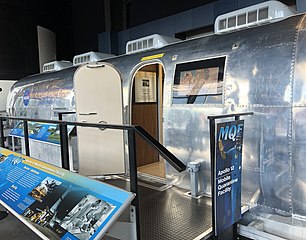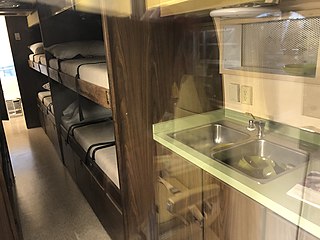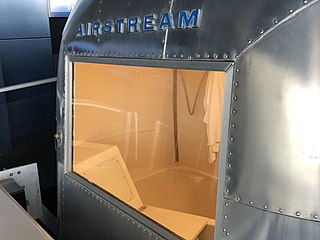Mobile quarantine facility

The mobile quarantine facility (MQF) was a converted Airstream trailer used by NASA to quarantine astronauts returning from Apollo lunar missions for the first few days after splashdown. The MQF was on the aircraft carrier that picked up the capsule. Once the aircraft carrier reached port, the MQF was flown to Houston, and the crew served the remainder of the 21 days of quarantine in the Lunar Receiving Laboratory at the Manned Spacecraft Center. The purpose of the quarantine was to prevent the spread of any contagions from the Moon, though the existence of such contagions was considered unlikely. It functioned by maintaining a lower pressure inside and filtering any air vented.[1]
History
[edit]In June of 1967, NASA awarded contract to design and build the four MQF's to Melpar, Inc., of Falls Church, Virginia. Lawrence K. Eliason was the head project manager.
The MQF contained living and sleeping facilities as well as communications equipment which the astronauts used to converse with their families. The Apollo 11 crew also used this equipment to speak with President Nixon, who personally welcomed them back to Earth in July 1969 aboard the recovery ship USS Hornet after splashdown.
The trailers housed the three crew as well as a physician, William Carpentier, and an engineer, John Hirasaki, who ran the MQF and powered down the command module.
-
The Apollo 11 mobile quarantine facility, with the crew on board, is unloaded from a C-141 aircraft.
-
MQF002 Apollo mobile quarantine facility on display at the Huntsville Space museum.
-
MQF002 Apollo mobile quarantine facility Electricity panel
-
MQF002 Apollo mobile quarantine facility with inside folding table
-
MQF002 Apollo mobile quarantine facility front door seals
-
MQF002 Apollo mobile quarantine facility sink and 6 bunk area.
-
MQF002 Apollo mobile quarantine facility kitchen Radar range microwave oven Fridge
-
MQF002 Apollo mobile quarantine facility bathroom sink.
-
MQF002 Apollo mobile quarantine facility rear bathroom tub and shower
-
MQF002 Apollo mobile quarantine facility kitchen exhaust vent and electrical connections
-
Apollo mobile quarantine facility rear generator and transformers
Four MQFs were built for NASA:
| Mission | Designation | Disposition |
|---|---|---|
| Apollo 11 | MQF003 | Formerly on display at the U.S. Space & Rocket Center. Currently on display at the National Air and Space Museum's Steven F. Udvar-Hazy Center.[2] |
| Apollo 12 | MQF002 | Converted for various purposes and found near Marion, Alabama. Currently on display at the U.S. Space & Rocket Center.[3] |
| Apollo 13 | MQF001 | Not used for the crew because they did not land on the Moon. For some time the USDA used it. Its present disposition is unknown.[2] |
| Apollo 14 | MQF004 | On display at the USS Hornet Museum in Alameda, California.[4] |
The quarantine requirement was eliminated following Apollo 14 once it was proven the Moon was sterile and that the facilities were therefore unnecessary.[5]
See also
[edit]References
[edit]- ^ "Mobile Quarantine Facility". Collections Database. National Air and Space Museum, Smithsonian Institution.
- ^ a b Pearlman, Robert (August 11, 2007). "Topic: Apollo 12 MQF trailer resurfaces". CollectSpace. Retrieved February 16, 2011.
- ^ "Space Camp Newsletter: Mobile Quarantine Facility". September 2007. Retrieved February 16, 2011.
- ^ Mason, Betsy (July 2009). "Wired Science News for Your Neurons Splashdown! The Ship That Picked Up the Apollo 11 Astronauts". Wired!.
- ^ "After Splashdown". Apollo to the Moon. National Air and Space Museum, Smithsonian Institution. July 1999. Archived from the original on February 24, 2004.
{{cite web}}: CS1 maint: unfit URL (link)











